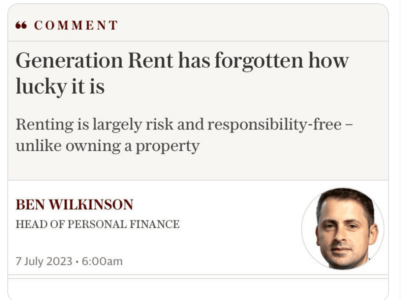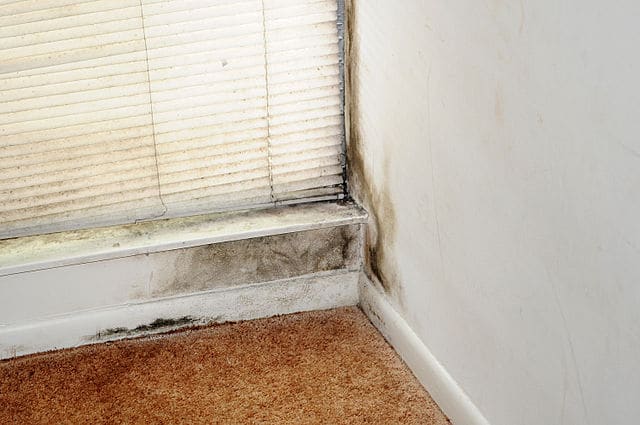Jasmine Birtles
Your money-making expert. Financial journalist, TV and radio personality.


The truth about renting isn’t often as it seems. We take a deeper look about whether it is a good or bad time to rent…
‘Generation rent has forgotten how lucky it is,’ a leading broadsheet newspaper claimed this week. Tell that to my friend’s 25-year-old son who, like most of his generation, has had to watch up to half his income each month be swallowed up by rent, and that’s before bills, eating, commuting and life came into the equation.
He could have moved further out from his South London flat but then he’d have to pay much higher commuting costs and the real savings would be minimal. Instead, when the rent jumped from £1,600 to £2,200, he decided to move back home and try and save some money – an impossibility when he was renting.
The rise in renters has led to high demand yet it was revealed today the number of UK properties available has hit a 14-year low. No surprise then some tenants are offering above the market rate to secure a property.
The knock-on-effect of this is that the average asking price for rent outside London has reached a record £1,190 a month while average London prices have topped £2,500 for the first time , according to experts at quotezone.
More than 1 in 3 renters use credit to pay rent

One broadsheet analyst suggests renters should consider themselves lucky when compared to people who stretched themselves to get on the property ladder at the peak of the market, and are now left to face punishing mortgage rises alone.
He even highlights the fact that renting is risk- and responsibility-free, pointing out that the landlord picks up the bills for the big things – roof leaks, broken ovens and washing machines – and that it enables tenants to live in places they couldn’t afford to buy as well as giving them flexibility.
But the stark truth is that however you manage to keep a roof over your head these days, latest figures from the Office for National Statistics reports 2.65 million people ran out of food in the past two weeks and couldn’t afford to buy more, such is their struggle with rents, mortgages and the cost of living.
The average queue of tenants requesting to view a rental property in Britain has jumped from an already high 20 to a depressing 25 in five months, figures show.
Property portal Rightmove said in September 2023 that the average advertised rent for a new let outside of London has risen to a record £1,278 per month – a rise of 10% in July to September compared with the same period last year, with agents describing the discouraging rise as “just crazy”.
A new poll from StepChange Debt Charity has recently revealed that 1 in 3 renters are using credit to settle their monthly rental debt, having to cut back on the essentials of life and digging into their savings.
The new figures commissioned by the charity through YouGov found that:
Richard Lane, Director of External Affairs at StepChange Debt Charity, said: “Amid a crisis of housing affordability that continues to intensify, tenants in the private rented sector remain among the groups with the least protection from problem debt and destitution.
“Our figures show that private renters are more likely than mortgage holders to be struggling with bills and credit commitments, and more likely to rely on credit to pay their rent, yet they feel unable to reach out to their landlord for help if they’re in difficulty. For a private renter experiencing financial insecurity, there is little to protect them from eviction if they fall into rent arrears.
“While we hope the government will follow through with its commitment to strengthen protections for PRS tenants through the Renters (Reform) Bill, especially through the end to Section 21 evictions, these proposed reforms alone will fail to prevent the most financially vulnerable tenants from losing their homes.
“Having mandatory protections in the PRS that mirror what already exists for social housing tenants and mortgagers would create a fairer and more sustainable system for private renters, which is especially vital as the cost of living crisis rages on.
“Housing law and policy are years behind the reality of a private rented sector where landlords are poorly placed to deal with the needs of struggling vulnerable tenants. Alongside legal reforms the Government must ensure that effective support is in place to help people stay in their homes without the constant fear of debt or eviction.”
Laura Suter, Head of Personal Finance at A J Bell says: ‘On average renters are handing over more than a fifth of their disposable income to have somewhere to live and that’s before they’ve heated it or paid council tax. And around four in 10 renters are finding it difficult to keep paying their rent.’
She adds: ‘What is emerging is a split society – those who face higher rent or mortgage costs and experience financial vulnerability compared to older, wealthier people who own their own home outright and are protected from the negative effects of rate hikes.’
If equity release is an option, you can find out more about it here.

Inevitably there are some landlords who are more ruthless than others, as Susan Kane (not real name) from York discovered.
‘I was renting a house for £950 a month in a fashionable area of the city. It had one bedroom, no central heating, and a horrific black mould problem that started to impact my health.
‘When I told my landlord he suggested I open the windows, despite the fact it was minus 3 degrees outside and there was ice on the inside of the windows. Multiple times he refused to help, when he actually did something it was to simply paint over the mould and said it was sorted.
‘I wasn’t in a financial position to move so was stuck in the mould pit – he had the power and he knew it.
‘Every shower, every potato boiled created damp, we spent a fortune on dehumidifiers. The landlord said we could just move if we didn’t like it. We had zero stability and the ever-present fear of being made homeless. When we could finally afford to move out two years later we saw the house go back on the market two months later.
‘There was still no central heating, the front door was like pulp, caused by the damp and the same lack of double glazing yet the rent had gone up to £1,400 a month for the same hellhole’.
Susan could have taken action but some landlords, as is likely in this case, can decide to evict rather than repair, says www.citizensadvice.org.uk. You could contact the local authority’s Environmental Health Department or take them to court but this is both time consuming and costly. For help and advice go to their website.
Cases like this highlight the need to know how to make the most of being a renter, including taking photos prior to moving in and taking inventory of damage to safeguard your deposit and avoid money being withheld at the end of a tenancy.
Is a gym, parking space or onsite washer and dryer included in the tenancy? Have you considered commuting costs and proximity to friends and family? This can help make a more-informed decision about the pros and cons of a particular property and whether it will actually be cheaper for you or not over time.
Your credit score can be badly affected if you don’t pay on time, making it harder to get a mortgage and other credit in the future. Some landlords also charge hundreds of pounds in late fees. Be honest if you are struggling and they may offer you some flexibility.
Sharing costs will give you more disposable income, even if it’s for the short term. But make sure you discuss it with your landlord to ensure you aren’t in breach of your contract and make sure there is a written agreement about how rent and utilities will be divided.
There should always be a month’s notice in place for price increases on rent. The rise should be fair, realistic and in line with other properties in the area. The price can only be increased once per year and remember that you can negotiate.
Take photos and videos of its condition – doors, windows, and highlighting anything that needs the landlords attention. Don’t be afraid to speak up. Landlords can’t make deduction for wear and tear. Do date and time stamp any damage you notice so you can’t be blamed. Problems such as damp walls and mould will need to be addressed immediately for health reasons and to prevent it becoming more serious.
If there’s an accident in the property it is important to notify the landlord straight away as this can help safeguard your deposit and avoid further damage.
This covers your items against theft and damage of furniture, electrical equipment and anything else you own. It also covers fire, floods and water damage. Check your tenancy agreement as some landlords insist you have insurance as part of the agreement.
If you need help with an issue, try www.justicefortenants.org for free advice and support.
